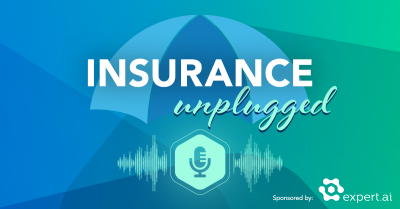
One of the best things about the Insurance Unplugged podcast is the candid conversations that take place. Just four episodes in, it’s not surprising that a recurring theme in these conversations is that the people part of the equation is just as important—and perhaps even more important—as the technology.
Last week’s episode with Ema Roloff digs into some of the people-centered aspects of adoption that are relevant for any technology implementation, but especially for technologies like AI, and especially today when things are moving so quickly.
Emma Roloff is the co-founder and principal consultant at Roloff Consulting, a sales strategy company that helps digitally transform the sales process. With a background teaching and over a decade of experience helping companies navigate their digital transformation journeys, Ema specializes in teaching people about the importance of digital literacy and people-driven change.
We’ve highlighted some of the important topics discussed with Ema and host Lisa Wardlaw.
The Reality of Dealing with New Technologies
Lisa Wardlaw:
Artificial Intelligence and generative AI can be intimidating topics for technology buyers. Beyond aspects like governance, bias and ethics, there is the human perspective: What is it doing? What can I control? What am I not going to control? At the same time, lots of people are already using applications like ChatGPT in their day-to-day roles, officially or unofficially. Can you talk about what is happening in our experience of grappling with these relatively new technologies?
Ema Roloff:
When you start to talk about the adoption of this technology and how much we use it in our personal lives, there is this acceptance of technology and how we consume technology that is very different from how we consume and interact with technology on a corporate scale or within our businesses.
Yet there isn’t the same need and desire to understand the backbone of what’s happening. And when you look at the corporate or work-related use cases of technology, oftentimes, because we’re layering this technology into potentially decade-long or old, ingrained processes, it’s harder to interrupt our patterns and bring these technologies into the work that we do. People really want to understand what’s happening behind the scenes when it comes to adopting these technologies at scale within businesses.
When it comes to something like ChatGPT where there’s a massive wave of hype, it starts to erode our trust a little bit: could it really be that good? At the same time, you hear stories about hallucinations or may directly have an experience where it really missed the mark. These negative experiences with the technology erode the trust behind what’s actually driving it, and this brings in a skepticism that starts to counteract the hype that we see when these technologies come out.
Right now, we’re in this kind of switch from the tidal wave of hype that came with generative AI where everyone was super excited, and we’re getting to the point where people are a little more skeptical. Maybe they had an experience where it gave them false information or they didn’t know how to prompt it, so it didn’t provide what they were looking for.
Now we’re kind of stepping back and thinking: are you as good as everybody said you were?
We will probably see the pendulum shift a couple more times before we really truly figure out how to operationalize the technology in a meaningful way.
The Importance of Digital Literacy
LW:
Artificial intelligence technologies offer some transformational opportunities. How do we get people to think outside of incremental improvements?
ER:
The key is really education. Over the course of my career, I’ve seen so many ‘aha’ moments when upskilling and education are in place. For me, this really boils down to digital literacy so that everyone is speaking the same language. This way, when executives have to take the step and push people outside of their comfort zone, they’re able to have the dialogue that’s needed with the foundational understanding across the board. To be able to really “see” the vision moving forward, people have to understand what’s actually possible from a technological perspective. And they have to understand what tools are potentially at their disposal to be able to influence some of those things.
I’ve led many ‘lunch and learn’ sessions with customers to do what I can to help as many people as possible to understand the full depth and breadth of the tools that they were buying and how they could use them.
I talk about it as “the art of the possible,” and I started building on this idea. Our time, I had this light bulb moment where I realized that the art of the possible is driven by digital literacy, and you can’t get to this visioning standpoint where you’re looking at where you can take your company unless everybody has that understanding.
So, if your team is in one of those standpoints where they’re maybe interacting with the systems that you’ve given them, but they’ve never been given the tools to go out and explore that art of the possible, you’ve got this chasm in your communication strategy that’s going to be really, really difficult to drop.
LW:
How immersive do you think digital literacy needs to be, given the pace of AI?
ER:
When it comes to the idea of digital literacy, it’s that foundational knowledge of at least being able to understand what questions to ask, at least being able to understand how what’s being talked about will impact you and your daily life.
So, we could go back to this idea of people-driven change. One of the most important parts of change management is understanding ‘what’s in it for me.’
If you don’t have enough understanding of technology and the terms being used and how it will impact your life, you’re never going to feel like you want to embrace the change because you’re not going to actually understand the impact it’s having on you or the benefit it offers you. So, when I talk about digital literacy, I think there are different flavors, depending on the roles in the company.
The average business user needs to at least be able to understand the conversations that are happening and understand what’s in it for them. Someone at the executive level will need to know more, because this skill set is part of what is critical for you to be successful. You need to be able to help drive timelines forward, select the right vendors.
LW:
What does digital literacy look like?
ER:
I think of it like learning a new language. ‘Digital Literacy’ is when you’re able to be conversational. I think that’s a perfect way of putting it. You don’t have to be fluent, but you have to be conversational. And that’s really what digital literacy is.
Listen to the full episode with guest Ema Roloff on the Insurance Unplugged podcast with Lisa Wardlaw.


